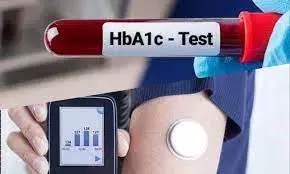- Home
- Medical news & Guidelines
- Anesthesiology
- Cardiology and CTVS
- Critical Care
- Dentistry
- Dermatology
- Diabetes and Endocrinology
- ENT
- Gastroenterology
- Medicine
- Nephrology
- Neurology
- Obstretics-Gynaecology
- Oncology
- Ophthalmology
- Orthopaedics
- Pediatrics-Neonatology
- Psychiatry
- Pulmonology
- Radiology
- Surgery
- Urology
- Laboratory Medicine
- Diet
- Nursing
- Paramedical
- Physiotherapy
- Health news
- Fact Check
- Bone Health Fact Check
- Brain Health Fact Check
- Cancer Related Fact Check
- Child Care Fact Check
- Dental and oral health fact check
- Diabetes and metabolic health fact check
- Diet and Nutrition Fact Check
- Eye and ENT Care Fact Check
- Fitness fact check
- Gut health fact check
- Heart health fact check
- Kidney health fact check
- Medical education fact check
- Men's health fact check
- Respiratory fact check
- Skin and hair care fact check
- Vaccine and Immunization fact check
- Women's health fact check
- AYUSH
- State News
- Andaman and Nicobar Islands
- Andhra Pradesh
- Arunachal Pradesh
- Assam
- Bihar
- Chandigarh
- Chattisgarh
- Dadra and Nagar Haveli
- Daman and Diu
- Delhi
- Goa
- Gujarat
- Haryana
- Himachal Pradesh
- Jammu & Kashmir
- Jharkhand
- Karnataka
- Kerala
- Ladakh
- Lakshadweep
- Madhya Pradesh
- Maharashtra
- Manipur
- Meghalaya
- Mizoram
- Nagaland
- Odisha
- Puducherry
- Punjab
- Rajasthan
- Sikkim
- Tamil Nadu
- Telangana
- Tripura
- Uttar Pradesh
- Uttrakhand
- West Bengal
- Medical Education
- Industry
Discordance between HbA1c and average blood sugar in CKD Patients with Diabetes, reveals study

Glycated haemoglobin A1c (HbA1c) and self-monitoring of blood glucose (SMBG) are cornerstones of glycemic monitoring in patients with diabetes. This means that the time available for the glycation of haemoglobin is identical. Several studies have found a reduced erythrocyte lifespan in patients on hemodialysis and proposed this as a key mechanism for lowering HbA1c because the glycation of haemoglobin is a continuous process throughout the erythrocyte lifespan.
A recent study suggests that there is discordance between HbA1C and glucose management indicator (GMI) derived from continuous glucose monitoring (CGM) data in patients with CKD. Therefore continuous glucose monitoring (CGM) provides a more precise glucose measure than HbA1c in patients with diabetes and chronic kidney disease (CKD). The study findings were published in the Journal of Diabetes Science and Technology on April 25, 2022.
The latest guidelines from Kidney Disease Improving Global Outcomes emphasize the uncertainty of HbA1c. The glucose management indicator (GMI) derived from continuous glucose monitoring (CGM) data could be an alternative. However, the concordance between HbA1c measured in the laboratory and GMI (HbA1c-GMI) is uncertain in individuals with CKD. Therefore, Dr Philippe Oriota and his team conducted a study to analyze this discrepancy.
In this multicentric, retrospective, observational study, the researchers included patients with diabetes and CKD (n = 170) and compared them with a group of individuals with diabetes without CKD (n = 185). They used intermittently scanned continuous glucose monitoring (isCGM) for glucose monitoring. They compared the 14-day and 90-day glucose data recorded by the isCGM to calculate GMI and the discordance between lab HbA1c and GMI. They further analyzed the obtained data by a Bland-Altman method and linear regression.
Key findings of the study:
- Upon analysis, the researchers found that HbA1c-GMI discordance was significantly higher in the CKD group versus without the CKD group (0.78 ± 0.57 [0.66-0.90] vs 0.59 ± 0.44 [0.50-0.66]%.
- They found an absolute difference >0.5% in 68.2% of individuals with CKD versus 42.2% of individuals without CKD.
- They further suggested a new specific formula to estimate HbA1c from the linear regression between HbA1c and mean glucose CGM, namely CKD-GMI = 0.0261 × 90-day mean glucose (mg/L) + 3.5579 (r2 = 0.59).
The authors concluded, "HbA1c-GMI discordance is frequent and usually in favor of an HbA1c level higher than the GMI value, which can lead to errors in changes in glucose-lowering therapy, especially for individuals with CKD. This latter population should benefit from the CGM to measure their glucose exposure more precisely."
For further information:
Medical Dialogues Bureau consists of a team of passionate medical/scientific writers, led by doctors and healthcare researchers. Our team efforts to bring you updated and timely news about the important happenings of the medical and healthcare sector. Our editorial team can be reached at editorial@medicaldialogues.in.
Dr Kamal Kant Kohli-MBBS, DTCD- a chest specialist with more than 30 years of practice and a flair for writing clinical articles, Dr Kamal Kant Kohli joined Medical Dialogues as a Chief Editor of Medical News. Besides writing articles, as an editor, he proofreads and verifies all the medical content published on Medical Dialogues including those coming from journals, studies,medical conferences,guidelines etc. Email: drkohli@medicaldialogues.in. Contact no. 011-43720751


